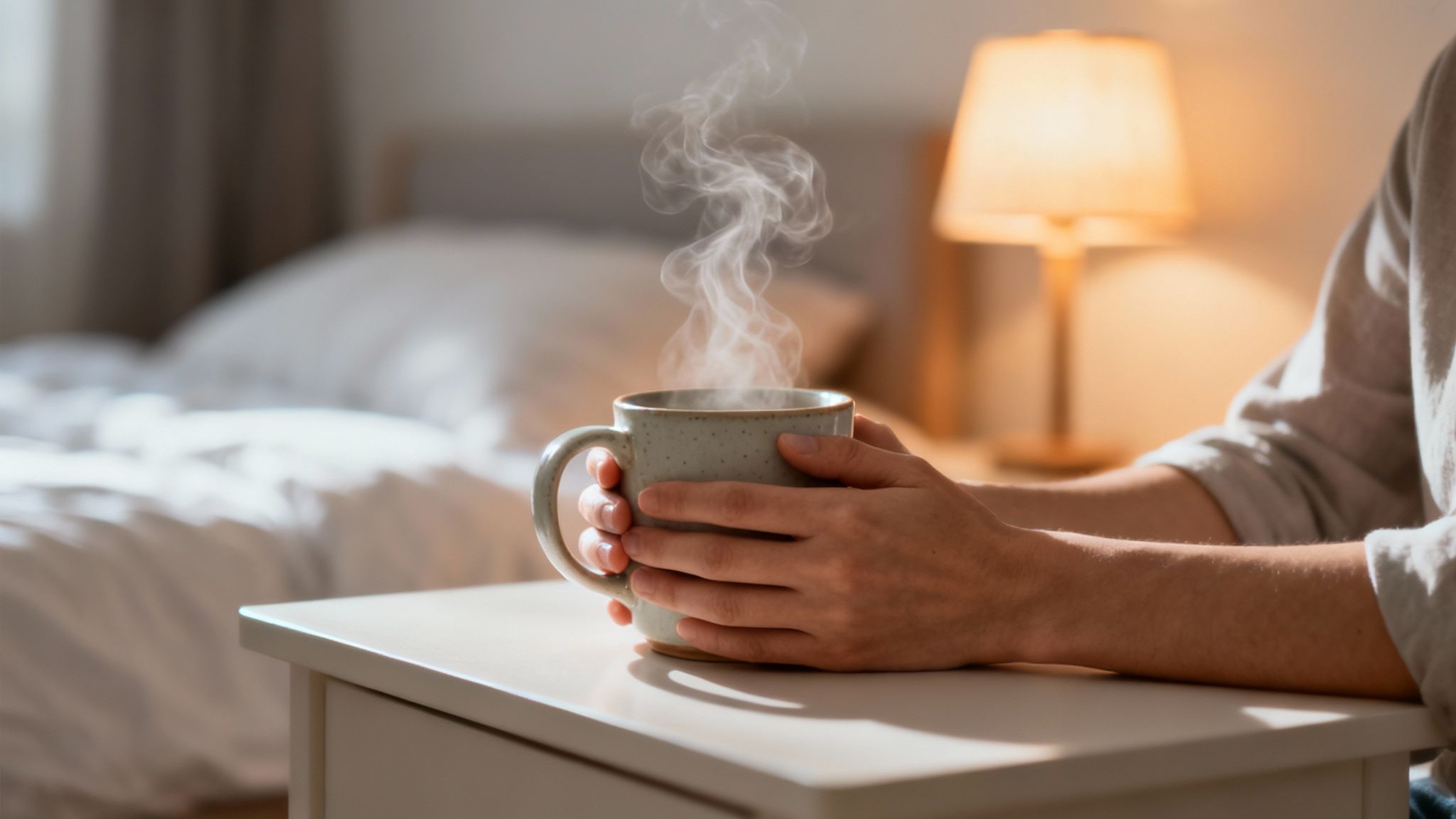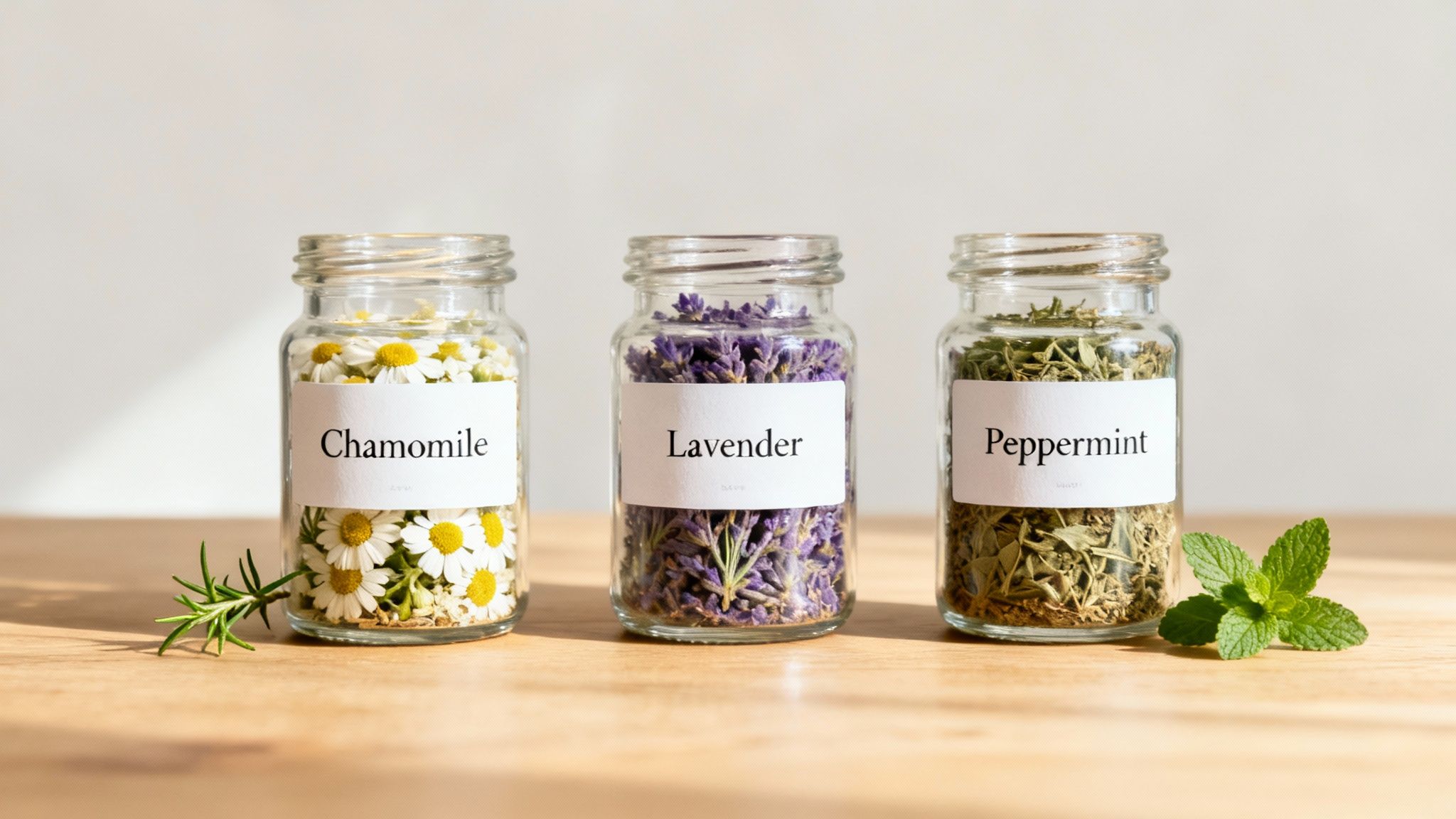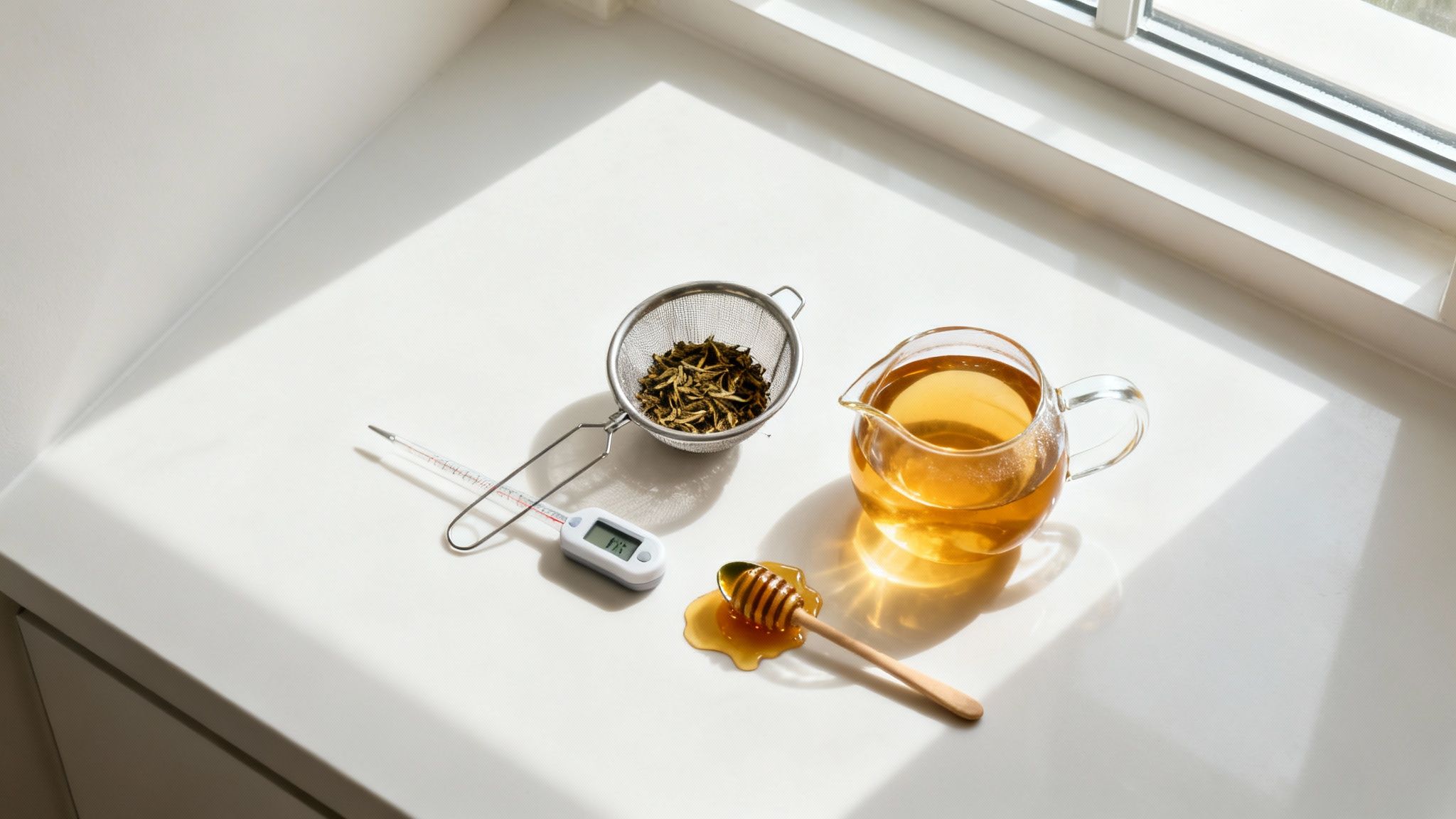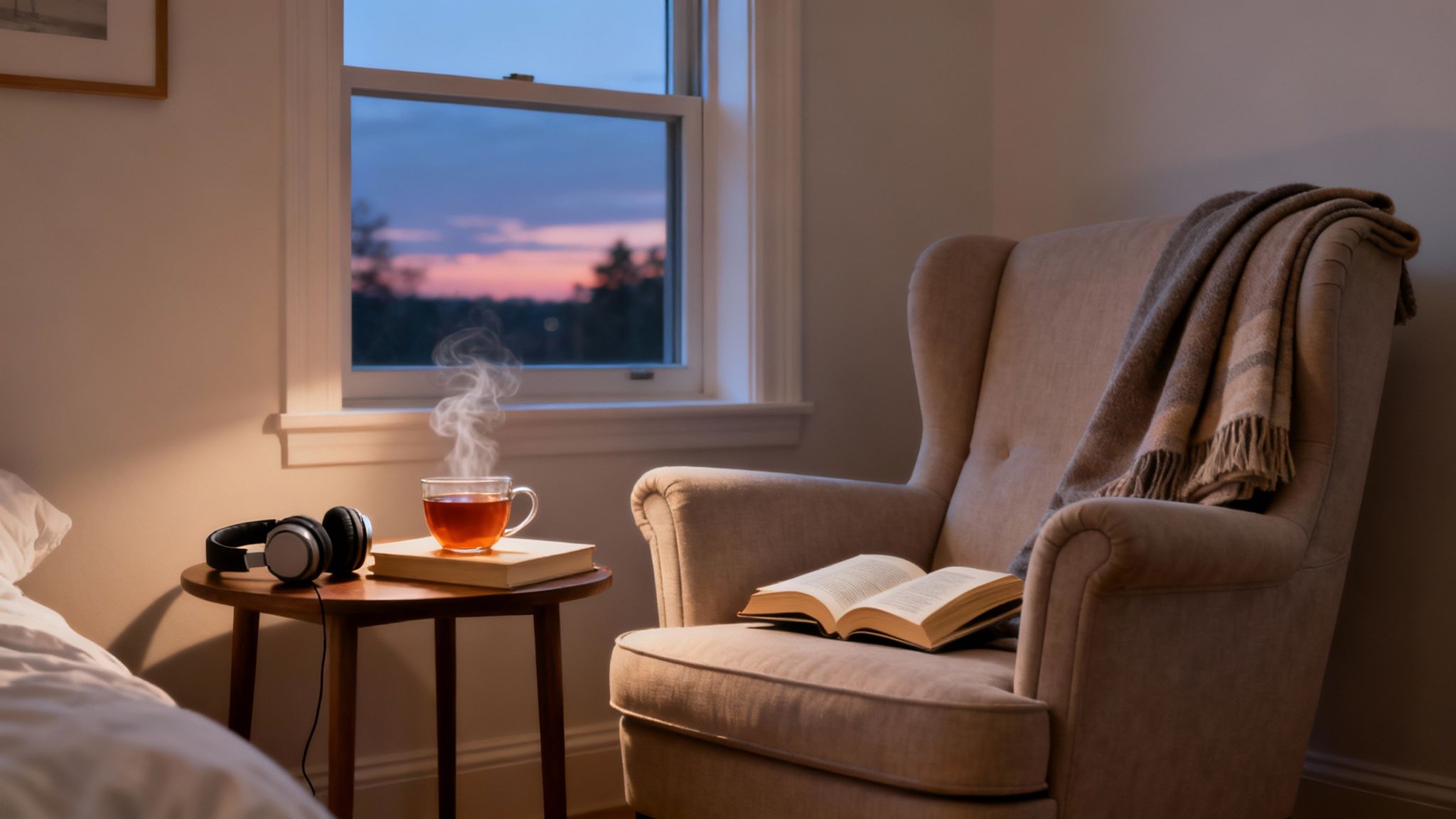There's something incredibly powerful in the simple act of making a cup of herbal tea for bedtime. It's more than just a warm drink; it's a ritual, a quiet moment that draws a line between the chaos of the day and the calm of the evening. It’s a signal to your body and mind that it's time to switch off and prepare for a truly restorative sleep.
Why a Bedtime Tea Ritual Improves Your Sleep

Think of your body's internal clock—your circadian rhythm—as a finely tuned instrument. It’s designed to respond to natural cues like sunlight and darkness to know when to be alert and when to rest. The problem is, our modern lives are full of mixed signals that can throw this rhythm completely off-kilter, making it hard to properly unwind.
This is where a nightly tea ritual can be a game-changer. By doing the same thing every night, you create a brand-new, powerful cue for sleep. The sound of the kettle boiling, the aroma of the herbs, the warmth of the mug in your hands—these all become familiar, comforting signals that the day is done and sleep is on its way.
The Science of a Simple Habit
This beautiful little habit works on a couple of levels. Psychologically, it’s a form of mindfulness. It pulls your focus away from lingering worries and grounds you in the present moment, helping to lower the stress hormone cortisol that often keeps us buzzing with anxiety.
On a physical level, sipping a warm, caffeine-free drink gently raises your body temperature. The subsequent cooling-down period actually mimics a natural temperature drop that happens just before you fall asleep, giving your body an extra nudge towards drowsiness. It’s a simple, consistent habit that helps get your sleep-wake cycle back on track.
A nightly ritual doesn't just pass the time; it actively trains your brain and body to recognise that the day is over. It’s a gentle yet effective way to reclaim the boundary between your active day and your restful night.
When you truly grasp the profound impact of sleep on our overall health, you start to see the real value in these small rituals. Before you know it, that simple cup of tea becomes an essential, non-negotiable part of your personal sleep toolkit.
The Best Caffeine-Free Teas for Restful Nights

Choosing the right tea for bedtime is a bit like picking the perfect soundtrack to unwind. Each herb has its own unique character and mood. While the simple warmth of any decaf cuppa is comforting, some herbs are packed with compounds that are brilliant at calming the nervous system, easing tension, and nudging your body toward a deep, restorative sleep.
This is about more than just finding a flavour you like. It’s about matching the tea’s natural benefits to what you actually need. Are you trying to quieten a racing mind? Soothe an unsettled stomach? Or just make it a little easier to drift off? Let's dive into some of the best and most beloved options to help you find your perfect nightly brew.
Chamomile: The Classic Sleep Inducer
When you think of a sleep tea, chamomile is almost certainly the first one that springs to mind. And for good reason. Its delicate, almost apple-like sweetness makes it a lovely, gentle introduction to the world of herbal infusions.
But its real magic lies in an antioxidant called apigenin. This compound binds to specific receptors in your brain, helping to dial down anxiety and kickstart the sleep process. For centuries, this simple daisy-like flower has been the go-to remedy for restlessness. It's a wonderful choice if stress is what’s keeping you awake, as it calms the mind without leaving you feeling groggy. A perfect start to any bedtime routine.
Valerian Root: The Potent Sedative
If chamomile is a gentle lullaby, then valerian root is a much more powerful sleep aid. It’s known for its strong, earthy aroma and has been used since ancient times to tackle insomnia and anxiety head-on. It works by increasing the levels of a neurotransmitter in the brain called GABA (gamma-aminobutyric acid).
Think of GABA as the brake pedal for your nervous system. It helps to quieten down all that frantic brain activity. When your mind won't stop replaying the day's events, valerian can bring the calm you need to finally switch off.
While its robust flavour can be an acquired taste, its effects are undeniable for those who need a bit more help nodding off. Many people find that blending it with something like mint or lemon balm helps to balance its powerful profile.
Soothing Blends and Other Calming Herbs
Beyond the two giants of sleep tea, there's a whole world of calming herbs waiting to be discovered. Each one offers a different experience, allowing you to tailor your bedtime cup to your exact mood. You can explore a wide variety of excellent non-caffeinated teas in our guide to find even more brilliant options.
Here are a few more fantastic choices:
- Lavender: Famed for its beautiful floral scent, lavender is celebrated for its ability to lower your heart rate and blood pressure, creating a profound sense of calm. The aroma alone is a powerful relaxation tool.
- Lemon Balm: A member of the mint family, this herb has a bright, citrusy flavour and is known for reducing stress and lifting your mood. It's an excellent choice if anxiety or low spirits are keeping you up.
- Peppermint: While sometimes seen as an energiser, peppermint is actually a brilliant muscle relaxant. It can help ease tension headaches and soothe digestive discomfort, clearing the path for a much more comfortable and peaceful night’s sleep.
Choosing Your Ideal Tea for Bedtime
Finding the right tea can feel overwhelming with so many options. To make it easier, we've put together a simple table comparing some of the most popular choices. Think about what you're hoping to achieve – whether it's calming your mind or relaxing your body – and let this guide you.
| Herbal Tea | Primary Benefit | Flavour Profile | Brewing Time (Minutes) |
|---|---|---|---|
| Chamomile | Gentle relaxation, anxiety reduction | Sweet, floral, apple-like | 5-7 |
| Valerian Root | Potent sedative, aids insomnia | Earthy, woody, pungent | 10-15 |
| Lavender | Deep calm, stress relief | Floral, slightly perfumed, sweet | 4-5 |
| Lemon Balm | Mood-boosting, stress reduction | Citrusy, fresh, slightly minty | 5-8 |
| Peppermint | Muscle relaxation, digestive aid | Strong, cool, minty | 3-5 |
Remember, brewing time makes a real difference. A longer steep will often result in a stronger effect, but can also make some teas (like Valerian) more bitter. Experiment a little to find what works perfectly for you.
This growing interest in herbal remedies reflects a bigger shift in our evening habits. While traditional black tea still dominates the £1 billion British tea market, wellness-focused infusions are quickly catching up. Today, 16% of Brits choose herbal teas as their main brew, often for their calming, caffeine-free benefits. This trend is especially strong among younger people, with one in five aged 18–24 now opting for herbal or green varieties in the evening. You can find out more about these market shifts and learn more about UK tea processing insights.
Should You Drink Caffeinated Tea Before Bed?
There’s something so comforting about a cup of black tea before bed, isn’t there? For many of us, it’s a cherished tradition – a classic, soothing end to the day. But what is the caffeine in that familiar cuppa really doing to your sleep?
You might not feel actively buzzed, but the science tells a different story. Caffeine is a stimulant, and its main job is to block a clever little neurotransmitter called adenosine. Think of adenosine as the key that unlocks the door to feeling sleepy; it builds up all day, letting your brain know when it's time to rest.
The problem is, caffeine fits perfectly into the same lock. By blocking adenosine, it keeps you far more alert than you might realise, even if you don't feel it. Even a small amount can get in the way of your natural sleep cycle, especially the deep, restorative stages. So while you might drift off just fine, the quality of your sleep takes a hit, leaving you feeling groggy the next morning.
The Great British Cuppa Conundrum
This is a tricky one, especially when the evening brew is so deeply woven into British culture. According to the UK Tea and Infusions Census, a whopping 71% of Brits still say black tea is their go-to, with old favourites like English Breakfast and Earl Grey staying popular well into the evening.
It's a habit that holds strong across all ages, though there are signs of a shift. While 63% of 18–24 year olds still favour black tea, 20% are now opting for herbal alternatives. This might be down to a growing awareness of caffeine's sneaky effects. You can dive into more of these national tea habits from the full census study.
The real issue isn't the tea itself, but the caffeine inside. Even if you don't feel wired, the stimulant can prevent your brain from slipping into those deep, restorative sleep phases crucial for physical repair and sorting through the day's memories.
But don't worry, this doesn't mean you have to abandon your beloved ritual. The solution is beautifully simple: just switch to decaf.
Making the Switch to Decaf
Decaffeinated black teas genuinely offer the best of both worlds. You get that same rich, robust flavour and comforting warmth you love, but without the stimulant that messes with your sleep.
The decaffeination process gently removes the vast majority of the caffeine, making it the perfect partner for your evening wind-down. You can keep the habit you cherish and let it support, rather than sabotage, a good night's rest.
It’s all about making smarter choices. Understanding the different caffeine content in teas can help you pick the right brew for the right time of day, not just at bedtime.
How to Brew the Perfect Calming Cup

There’s a real art to brewing a cup of tea that can genuinely soothe you before bed, and it goes far beyond just plopping a bag in a mug. A few simple tweaks to how you brew can completely transform your nightly cup, unlocking a depth of flavour and amplifying those lovely calming properties.
Think of those delicate chamomile flowers or lavender buds. If you hit them with straight-up boiling water, you risk scorching the delicate botanicals, which can leave you with a bitter, disappointing brew. A simple trick is to let your kettle click off and then just wait a minute before you pour. This slightly cooler water coaxes out all the subtle, aromatic notes without shocking them.
Finding the Sweet Spot for Steeping
Just as crucial as the water temperature is the steeping time. It’s all about finding that perfect balance—long enough to extract all the good stuff, but not so long that it turns bitter. Each herb has its own ideal infusion time.
- Delicate Flowers (Chamomile, Lavender): These only need about 5-7 minutes. Any more, and their gentle flavour profile can become sharp.
- Hearty Roots (Valerian): Being much tougher, these need a bit more time to release their potent compounds. Give them a good 10-15 minutes.
- Leaves and Mints (Lemon Balm, Peppermint): A steep of 3-5 minutes is usually spot-on to capture their bright, fresh character perfectly.
Your brewing time is the final, crucial step in crafting the perfect calming cup. A few extra minutes can be the difference between a weak infusion and a potent brew that genuinely helps you unwind.
Loose-Leaf Versus Tea Bags
While tea bags are undeniably convenient, you’ll often find that loose-leaf tea delivers a far richer and more nuanced flavour. It’s because the leaves are whole, not crushed into dust. This gives them space to unfurl in the hot water, properly releasing their essential oils and creating a much fuller, more complex taste.
If you’re keen to explore this, you can learn more about how to brew loose leaf tea and take your nightly ritual to the next level.
Ultimately, the best tea for bedtime is the one you most enjoy making and drinking. Don't be afraid to experiment. Play around with these techniques, maybe add a touch of local honey or a slice of lemon, and make the ritual entirely your own.
Building a Complete Pre-Sleep Routine

A calming cup of tea for bedtime is a lovely start, but its true magic is unlocked when it becomes the heart of a bigger pre-sleep routine. Don't just think of it as a drink. Think of it as the starting pistol for a sequence of events that tells your body and mind, "Right, it's time to wind down now."
This is all about creating a buffer zone between the chaos of the day and the quiet of the night. When you build a consistent ritual, you're creating powerful psychological cues that signal it's time for sleep. The aim is to make drifting off feel natural and easy, not like a switch you have to force.
Timing Your Tea Perfectly
To get the full relaxing benefits without risking a middle-of-the-night trip to the loo, timing is everything. Try to finish your last cup around 60-90 minutes before you actually plan to turn out the lights.
This gives your body plenty of time to process the liquid, while the calming effects of the herbs are just reaching their peak as your head hits the pillow. It’s a simple tweak that makes a world of difference to getting a solid, uninterrupted night's rest.
A pre-sleep routine is like a gentle, guided meditation for your nervous system. Each step—brewing the tea, turning down the lights, picking up a book—is a deliberate move away from stimulation and towards tranquillity.
This nightly cuppa is a deeply ingrained part of British life. A YouGov survey found that a staggering 41% of British adults drink tea at home at least twice a day, with many adding an evening herbal brew to their schedule for comfort and sleep. To truly understand why this works so well, it's worth exploring the psychology of reset rituals and how these small habits create big changes in our mindset.
Pairing Your Tea with Calming Activities
Once you've got your warm mug in hand, the next step is to pair it with another screen-free activity to really deepen the sense of calm.
- Read a Physical Book: Step away from the blue light of tablets or phones, which can mess with your body's melatonin production. The feel of paper is far more relaxing.
- Listen to Soothing Music or a Podcast: Pop on some gentle soundscapes or a calm, rambling podcast to quieten the mental chatter.
- Simple Mindfulness: Just for a moment, focus entirely on the tea. Notice its aroma, the warmth of the mug in your hands, and the flavour of each sip. It’s a mini-meditation in itself.
A Few Common Questions About Bedtime Teas
When you start exploring the world of bedtime teas, a few practical questions naturally pop up. Getting these details sorted is the key to perfecting your nightly ritual, making sure you're getting all the calm and none of the hassle.
When’s the Best Time to Drink My Sleep Tea?
This is a great question, and timing really is everything. To hit that sweet spot of maximum relaxation without a middle-of-the-night trip to the loo, try to have your last cup about 60 to 90 minutes before you want your head to hit the pillow.
This little window gives your body enough time to absorb all those lovely, calming compounds while also processing the liquid. You’ll be able to drift off without a single interruption.
Are There Any Side Effects I Should Know About?
For the most part, herbal teas like chamomile and peppermint are wonderfully gentle and safe to enjoy every day. That said, some of the more potent herbs can sometimes have a chat with certain medications. Valerian root, for example, might interact with prescriptions for anxiety or sleep.
If you have any health conditions or are on regular medication, it’s always a good idea to have a quick word with your doctor before making a new herbal tea a firm fixture in your routine.
On a lighter note, while it's perfectly fine to have the same brew every night, why not mix it up? Rotating your blends keeps things interesting and introduces you to a whole new world of flavours and benefits.
Ready to wind down properly? Take a look at the beautiful selection of calming herbal infusions at Jeeves & Jericho and find your perfect nightly cup. You can discover our full range here: https://www.jeevesandjericho.com.


